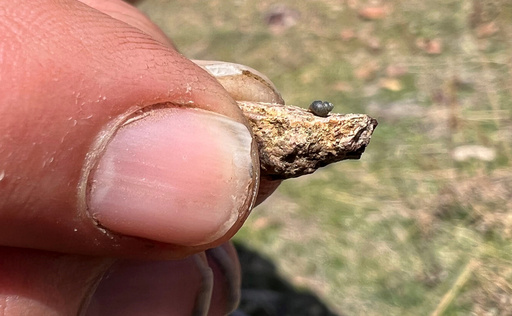RENO, Nev. — Opponents of the largest lithium mine currently being developed in the United States are urging federal officials to investigate potential reductions in groundwater levels that could threaten the existence of a small snail species, prompting consideration for endangered species designation. Environmental advocates, along with Native American groups, have raised alarms over new findings that support their concerns about Lithium Americas’ proposed open pit mine located at Thacker Pass, whose operations are expected to cover approximately 9 square miles (23 square kilometers).
The plight of the snail has become a focal point following the dismissal of a legal challenge brought by Native American tribes. These tribes had sought recognition from federal agencies of the area’s sacred significance, citing the site where U.S. soldiers killed many of their ancestors in 1865. The tribes are now emphasizing the need for further scrutiny into the project’s environmental impacts.
Organizations such as Western Watersheds Project and the People of Red Mountain have issued a notice indicating their intent to sue, claiming that both the U.S. government and Lithium Americas fell short in adequately monitoring the mine’s effect on groundwater. They express deep concern over an analysis by Payton Gardner, an assistant professor of hydrogeology at the University of Montana, revealing nearly a 5-foot (1.5 meters) decline in water table levels since 2018. While state regulators have not yet confirmed this assessment, they have pledged to keep a close watch on groundwater conditions during the operation of the mine.
The Kings River pyrg, a snail no larger than a grain of rice, has managed to live in only 13 isolated springs surrounding the mine site—its sole habitat globally. The snail requires minimal water to survive, but its chances of survival diminish significantly if the groundwater that feeds these springs decreases, according to Paul Ruprecht, the Nevada Director for Western Watersheds Project. He warned that even minor disruptions to its environment can dry up springs, potentially leading to the extinction of this species.
The opponents further contend that the U.S. Fish and Wildlife Service is neglecting its responsibilities under the Endangered Species Act by not making timely decisions regarding a petition from 2022 that sought to classify the snail as threatened or endangered. Their concerns have prompted previous requests for federal biologists to investigate whether exploratory drilling and related activities are causing groundwater depletion and impacting the springs.
Without timely protective measures, Ruprecht cautioned that the snail could become yet another victim of the lithium surge brought on by increasing demand for electric vehicle batteries. Though the Fish and Wildlife Service is reviewing the snail’s status, the agency has not commented on the recent calls for an investigation regarding groundwater issues.
As demand for lithium—essential for electric vehicle batteries—increases, Nevada’s mining projects are drawing attention. President Joe Biden has prioritized the expansion of electric vehicle production, and last year the U.S. Energy Department agreed to loan Lithium Americas over $2 billion to support the Thacker Pass project’s construction. Recently, the company announced a joint venture with General Motors Holdings LLC for mine development and operations.
Located about 200 miles (322 kilometers) north of Reno, the Thacker Pass project is set to be the largest lithium operation in the U.S. soon followed by Ioneer’s Rhyolite Ridge project situated between Reno and Las Vegas. Additionally, the Bureau of Land Management has solicited public comments on another lithium exploration proposal in northeastern Nevada by Surge Battery Metals USA.
Ruprecht mentioned that reports from Lithium Americas’ environmental consultant indicate that the company can no longer access private lands where several monitoring wells are stationed, complicating efforts to assess potential impacts from previous drilling activities. Although state regulators approved modifications to the monitoring plan to adapt to this loss of access, past data had shown that groundwater levels were stable from the 1960s up until 2018, with mining activities commencing in 2023.
While the Bureau of Land Management has acknowledged the possibility of groundwater level reductions, it anticipates these changes would not occur for many years, and primarily if permission is granted for excavation below the water table. Tim Crowley, a spokesman for Lithium Americas, suggested that opponents are rehashing issues that have already been addressed in court, citing a decade of data collection demonstrating minimal impact on the snail from the project.


